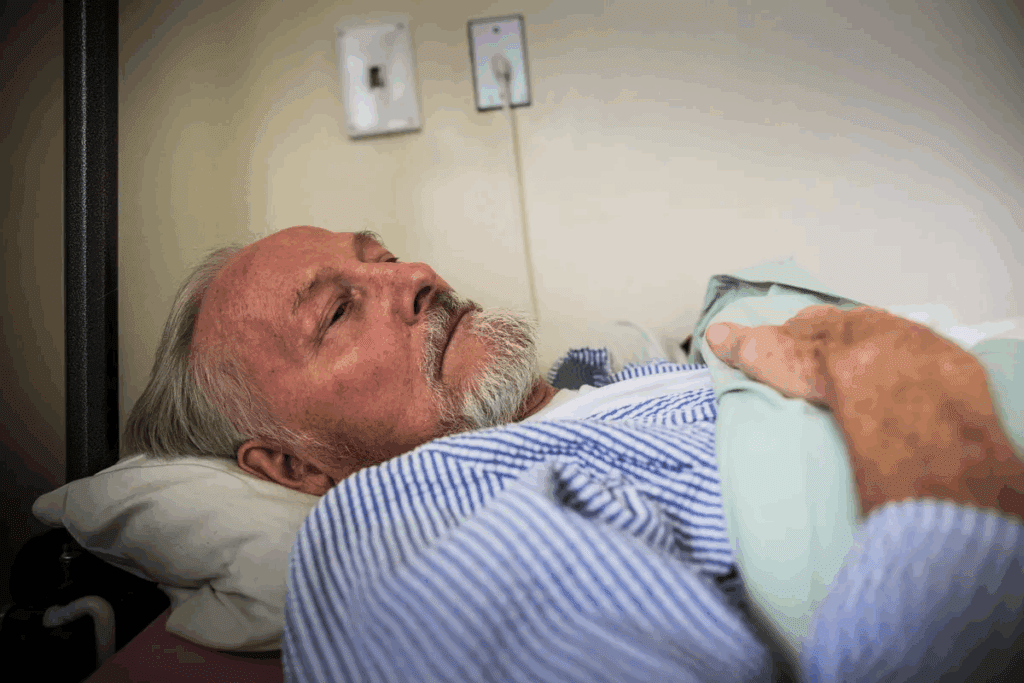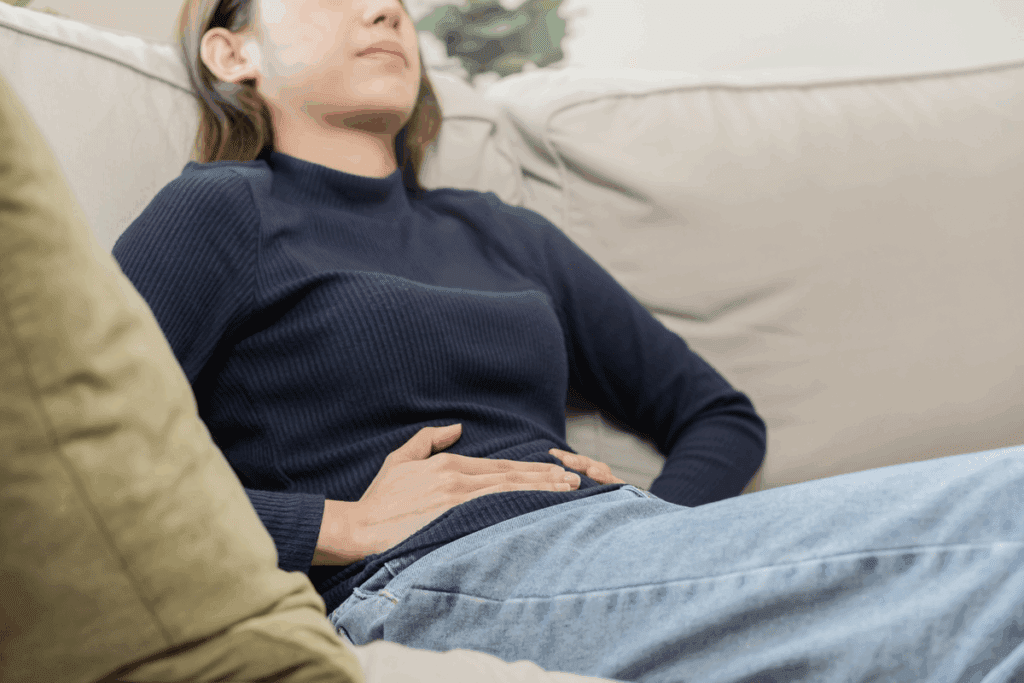Last Updated on November 26, 2025 by Bilal Hasdemir

When caught early, colorectal cancer has a great chance of being treated successfully. Over 90% of people diagnosed at this stage can live for at least five years. This cancer develops in the colon, a key part of our digestive system.
It’s vital for patients and their families to know about the best treatments. This knowledge helps in making informed decisions.
Liv Hospital focuses on the patient’s health above all. They use the latest in surgery and precision medicine. This means early-stage colorectal cancer can often be treated effectively.

Getting the right stage for colorectal cancer is key for doctors to pick the best treatment. They look at the tumor size, lymph nodes, and whether the cancer has spread.
The TNM system is a common way to stage colorectal cancer. It looks at three main parts: T (Tumor), N (Node), and M (Metastasis).
Colorectal cancer is divided into st0-IV0-III, with stage IV being the most severe.
Accurate staging is very important. It helps doctors decide on the best treatment and what the patient’s chances of recovery are.
Knowing the stage of colorectal cancer helps doctors tailor the treatment. This can lead to better results for the patient.

Finding colorectal cancer early can greatly improve treatment success. Early detection is key, and there are many ways to diagnose this disease.
Screening for colorectal cancer depends on age. The American Cancer Society suggests starting regular screening at 45 for those with average risk. Screening can prevent colorectal cancer by finding and removing polyps before they turn cancerous.
Several diagnostic procedures help find colorectal cancer. Colonoscopy is the top choice, letting doctors see the whole colon and remove polyps.
“Colonoscopy is a powerful tool in the prevention and early detection of colorectal cancer.”
Other methods include sigmoidoscopy, which looks at the lower colon, and biopsy, where tissue is checked for cancer cells.
Biomarkers and genetic testing are getting more important in diagnosing colorectal cancer. Biomarkers help find who will benefit most from certain treatments.
Genetic tests can spot genetic changes that raise colorectal cancer risk, like Lynch syndrome. This helps guide screening and treatment plans.
Early stage colorectal cancer is a big health issue. It needs a deep look at its causes, signs, and risk factors. Knowing about this disease helps us find better ways to prevent and treat it.
Colorectal cancer is mainly adenocarcinoma, making up about 90% of cases. Doctors look at tissue samples to learn about the tumor’s details, like its grade and stage.
Classification uses the TNM system. It looks at the tumor’s size, the nearby lymph node, nd whether it has spread. Knowing this helps doctors predict the outcome and choose the right treatment.
The signs of early colorectal cancer can be hard to spot. They might include changes in bowel habits or blood in the stool.
These symptoms can also mean other things. So, it’s key to see a doctor for a proper check-up.
Some things make you more likely to get colorectal cancer. These include:
To prevent it, eat well, stay active, and keep a healthy weight. Screening tests can also find and remove polyps before they turn cancerous.
“The best way to prevent colorectal cancer is through a combination of a healthy lifestyle and regular screening.”
By knowing the disease’s details, its signs, and risk factors, we can fight it better. This helps in preventing and catching colorectal cancer early.
The main treatment for early colorectal cancer often uses surgery. Can be simple polypectomies or more complex resections. Accurate staging and planning are key to successful treatment.
For stage 0 colorectal cancer, polypectomy is often chosen. This removes the polyp with cancer cells during a colonoscopy. It’s a simple procedure that might avoid bigger surgeries.
Minimally invasive surgeries, like laparoscopic and robotic-assisted, have big benefits. They cause less pain, faster recovery, and fewer complications than open surgery.
Even though new methods are popular, traditional open surgery is sometimes needed. It uses a bigger cut and is for complex cases or hard-to-reach cancers. The choice depends on the cancer’s stage, location, and the patient’s health.
Ensuring good surgical margins and lymph node removal is vital. The margin is the tissue around the tumor removed. A clear margin means no cancer cells at the edge. Removing lymph nodes helps stage the cancer and may affect treatment plans.
Knowing the right treatment for early-stage colorectal cancer is key. Each stage has its own treatment plan. This ensures the best results for patients.
Stage 0 colorectal cancer, or carcinoma in situ, is treated with polypectomy or local excision. This method works well because the cancer is only in the innermost layer. It hasn’t spread deeper.
“The goal of treatment at this stage is to remove the cancerous area completely, preventing further progression.” – Expert Oncologist
Stage I colorectal cancer treatment often starts with surgical resection. The surgery removes the affected part of the colon or rectum. It also takes out some healthy tissue around it.
Studies show that the stage 1 colon cancer survival rate by age is high. This is true when the cancer is caught and treated early.
For stage II colorectal cancer, surgery is usually the main trtreatmentadjuvant chemotherapy might be suggested. This is to lower the chance of the cancer coming back if there are high-risk signs.
In early stage III colorectal cancer, treatment combines surgery and adjuvant chemotherapy. The chemotherapy aims to kill any cancer cells that might have spread to the lymph nodes or other places.
The stage 3b colon cancer survival rates depend on several things. These include the patient’s health and how well they respond to treatment.
Adjuvant chemotherapy is now a key part of treaearly-stagestage colorectal cancer. It’s given after the main treatment, like surgery. This helps kill any cancer cells left behind, lowering the chance of cancer coming back.
Fluorouracil (5-FU) has been a mainstay in treating colorectal cancer for years. It’s often mixed with leucovorin to make it work better. Fluorouracil-based regimens have been proven to increase survival rates for stage II and III colorectal cancer patients.
“The addition of fluorouracil to surgical treatment has significantly improved outcomes for patients with early-stage colorectal cancer.”
Oxaliplatin has made adjuvant chemotherapy for colorectal cancer even more effective. Oxaliplatin combinations, like FOLFOX (fluorouracil, leucovorin, and oxaliplatin), have shown better disease-free survival and overall survival in studies.
| Treatment Regimen | Disease-Free Survival | Overall Survival |
| FOLFOX | 73.3% | 82.3% |
| 5-FU/LV | 67.4% | 78.9% |
Choosing the right patients for adjuvant chemotherapy is key. Doctors look at tumor stage, grade, and molecular markers. Those with high-risk features, like T4 tumors, might benefit from chemotherapy.
How long to treat with adjuvant chemotherapy is being studied. Treatment usually lasts 3 to 6 months, based on the regimen and patient factors. Shorter treatment durations might cut down on side effects without losing effectiveness.
In summary, adjuvant chemotherapy is a critical part of treaearly-stagestage colorectal cancer. It offers better outcomes for patients. The right regimen and treatment length depend on the patient and tumor specifics.
Recent breakthroughs in targeted therapies are giving new hope to patients with early-stage colorectal cancer. These therapies are a big step forward, providing more precise and effective treatments.
BRAF mutations are found in some colorectal cancer patients and are linked to a poorer prognosis. Targeted therapies against these mutations are showing promise. For example, studies have shown that combining BRAF inhibitors with other treatments can be effective.
EGFR inhibitors are another type of targeted therapy being studied in early-stage colorectal cancer. These inhibitors block the epidermal growth factor receptor, which is often too active in cancer cells. Clinical trials have shown that EGFR inhibitors can be beneficial in some cases.
The BREAKWATER trial is a key study looking at a new targeted therapy approach in colorectal cancer. Early results from this trial are promising, indicating that combining targeted agents can lead to better outcomes for patients with widely staged disease.
Other molecular pathways are also being explored as targets in colorectal cancer. New therapies are being developed to target genetic mutations and changes that drive cancer growth.
| Targeted Therapy | Mechanism of Action | Clinical Application |
| BRAF inhibitors | Inhibit BRAF mutation | Patients with BRAF-mutant colorectal cancer |
| EGFR inhibitors | Block EGFR signaling | Patients with EGFR-expressing colorectal cancer |
| Other emerging targets | Vary by target | Patients with specific genetic mutations or alterations |
The use of targeted therapies for early-stage colorectal cancer is a major advancement. It’s a step towards better patient outcomes. Ongoing research and trials will help refine these therapies and find new targets.
In early stage colorectal cancer, immunotherapy is making a big difference. It’s working well for certain types of the disease. This is thanks to new research that shows it can help patients with specific tumor traits.
MSI-H tumors are a special kind of colorectal cancer. They have a lot of genetic changes. Immunotherapy works really well on these tumors because they have so many changes that the immune system can spot.
Research shows that MSI-H tumors do better with immunotherapy. They live longer than tumors that don’t have these changes. The KEYNOTE-177 trial is a great example. It shows how pembrolizumab helps MSI-H colorectal cancer.
Immune checkpoint inhibitors are changing how we treat cancer, including colorectal cancer. These drugs help the immune system fight cancer cells better by blocking checkpoints.
Drugs like pembrolizumab and nivolumab are showing great promise. They target specific stops in the immune system. This makes them a good choice for MSI-H colorectal cancer patients.
Doctors are trying different ways to make immunotherapy even better for early-stage colorectal cancer. They’re mixing different immunotherapy drugs or adding other treatments like chemotherapy. This might make treatments work better.
There are many studies looking at these combinations. They’re testing things like ipilimumab with nivolumab. The goal is to find the best mix for each patient.
Choosing the right patients is key for immunotherapy to work in colorectal cancer. Biomarkers like MSI status and PD-L1 expression help doctors pick who will do best with immunotherapy.
| Biomarker | Significance | Immunotherapy Response |
| MSI-H | High mutational burden | Positive response to immunotherapy |
| PD-L1 Positive | Expression of PD-L1 on tumor cells | Increased likelihood of response to checkpoint inhibitors |
By carefully choosing patients based on these biomarkers, doctors can make immunotherapy more effective. This helps improve treatment results for early-stage colorectal cancer patients.
For patients with colorectal cancer, a team effort is key. This team approach makes sure every part of a patient’s care is covered. It leads to better treatment results.
A team of experts from different fields comes together in the tumor board approach. They discuss patient cases together. This way, they can create a treatment plan that fits the patient perfectly.
Tumor boards include surgeons, medical oncologists, radiation oncologists, pathologists, and radiologists. Their combined knowledge helps create a treatment plan that covers all bases.
Early stage colorectal cancer treatment often needs a mix of surgery, chemotherapy, and radiation. A team can make sure these treatments work well together.
Neoadjuvant chemotherapy can make tumors smaller before surgery. Adjuvant chemotherapy helps get rid of any cancer cells left after surgery.
Personalized care is a big part of team treatment. Doctors look at each patient’s cancer and health to make the best plan. This makes treatment more effective and satisfying for the patient.
This approach also saves resources. Treatments are focused on those who will benefit most.
By using a team effort, patients with colorectal cancer get care that’s tailored to them. This ensures they get the best possible treatment.
Knowing the survival rates of early-stage colorectal cancer is key for patients and doctors. This info helps in choosing the right treatment and understanding what to expect.
Survival rates for colorectal cancer change a lot based on the stage. Early-stage cancer has a high five-year survival rate, like stage I. The American Cancer Society says the five-year survival rate for stage I colon cancer is about 92%.
For stage II, the rate is around 63-87%. This depends on how deep the tumor is and whether lymph nodes are involved.
Stage-specific survival statistics give us a clear view of what to expect. For example, stage II has a better outlook than stage III. But, certain high-risk features can change this.
Age is a big factor in colorectal cancer prognosis. Younger patients usually have a better chance of survival. This is because they often have fewer health problems and can handle treatments better.
Age-related prognosis considerations also look at how different ages react to treatments. For example, older adults might need special treatment plans because of health issues and how their body processes drugs.
The treatment chosen greatly affects early-stage colorectal cancer outcomes. Surgery, chemotherapy, and targeted therapy all play a part in the patient’s prognosis.
Treatment selection should be tailored to the patient. This means considering the cancer stage, the patient’s health, and the tumor’s characteristics. For stage III colon cancer, adjuvant chemotherapy is often used to lower the chance of cancer coming back.
Moderately differentiated adenocarcinoma is a common type of colorectal cancer. The prognosis depends on the stage and other tumor details.
When diagnosed early, outcomes for moderately differentiated adenocarcinoma are usually good. But, if there’s lymphovascular invasion or poor differentiation in the tumor, the prognosis can be worse.
After treatment, patients with early-stage colorectal cancer need ongoing care. This care is key for survival and quality of life. Regular monitoring and follow-up are critical during this time.
A set follow-up schedule helps catch any signs of cancer coming back early. The National Comprehensive Cancer Network (NCCN) offers guidelines. These include:
A study in the Journal of Clinical Oncology found that close monitoring after surgery can improve survival rates.
“The follow-up strategy should be tailored to the individual patient’s risk of recurrence and overall health status.”
Managing side effects from treatment is also part of post-treatment care. These can include:
| Side Effect | Management Strategy |
| Bowel dysfunction | Dietary changes, medication, and pelvic floor therapy |
| Neuropathy | Pain meds, physical therapy |
| Fatigue | Exercise, counseling, and rest |
Making lifestyle changes can help prevent cancer from coming back. Recommendations include:
These lifestyle changes can prevent recurrence and improve health and well-being.
Survivors’ needs change after treatment. Long-term care focuses on late treatment effects, mental support, and healthy habits.
By focusing on detailed post-treatment care, healthcare providers can greatly improve survivors’ long-term outcomes and quality of life.
Patients with colorectal cancer need to make smart treatment choices. Knowing about their diagnosis, treatment options, and what to expect helps them work well with their healthcare team. Together, they can create a treatment plan that fits the patient’s needs.
The age and stage of colon cancer greatly affect treatment choices. For example, knowing the 10-year survival rate for colon cancer can help decide the best treatment path.
Patients can make better choices by understanding these factors and staying up-to-date with new treatments. This teamwork in care can lead to better results and a better life for the patient.
The survival rate for stage 2 colon cancer changes with age. Younger patients usually do better. Studies show a 5-year survival rate of 80-90% for those under 50. For those over 70, it’s about 60-70%.
Moderately differentiated adenocarcinoma has a good survival rate. It’s about 70-80% for early-stage disease. This is better than some other types.
Stage 3 colon cancer treatment often includes surgery and chemotherapy. The 5-year survival rate is 40-60%. Some studies show that chemotherapy can boost survival by 10-20%.
Age greatly affects stage 4 colon cancer survival rates. Older patients have poorer outcomes. Their 5-year survival rate is 10-20%. Younger patients have a 20-30% chance.
Immunotherapy is a promising treatment for MSI-H tumors. It has shown great effectiveness, with response rates of 30-50%. This is a big step forward in cancer treatment.
The tumor board approach brings together experts for personalized treatment plans. This ensures patients get the best care and access to new treatments.
Post-treatment caristo for catis recurrencee and managing side effects. It includes regular check-ups and tests. The schedule depends on the cancer’s stage and type.
Healthy lifestyle choices can lower recurrence risk. Eating well, exercising, and not smoking are important. They also improve survival and quality of life for early-stage cancer patients.
Stage 1 colon cancer survival rates are very high. They are 90-100% for all ages. Younger patients might have even better outcomes, with a 100% 5-year survival rate under 50.
Survival rates vary a lot by age. Younger patients generally do better. For example, stage 2 colon cancer survival is 80-90% for those under 50. It’s 60-70% for those over 70.
Choosing the right treatment is very important for early-stage colorectal cancer. Patients who get the right treatment, like surgery and chemotherapy, do better. They live longer and have a better quality of life.
National Cancer Institute. (2023). Colon and rectal cancer treatment (PDQ®)–patient version. Retrieved October 2025, from
https://www.cancer.gov/types/colorectal/patient/colon-treatment-pdq
Subscribe to our e-newsletter to stay informed about the latest innovations in the world of health and exclusive offers!